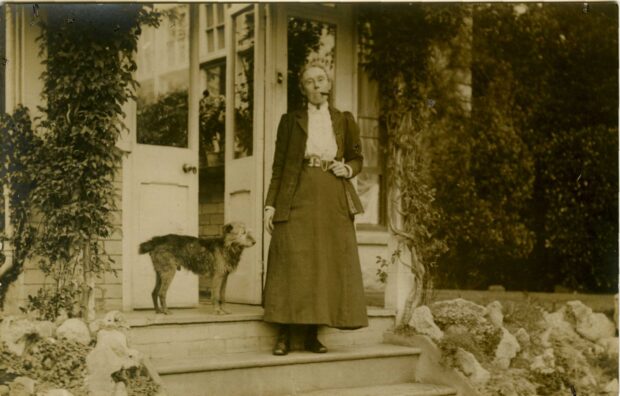As a digital content designer here at Companies House, it’s been a pleasure to research and write this blog for LGBT History Month. This is because I discovered the story of Amy Dillwyn quite by chance.
I confess to never knowing of Amy Dillwyn before this week, and I found her story and legacy too interesting not to look into further. Wearing ‘mannish’ clothes, trilby hat, and rarely seen without a cigar, she was viewed as eccentric, but honest and hardworking. She would be later be recognised as ‘a pioneering female industrialist’. One of Britain’s first, in fact.

Lesbian novelist
In more recent times, Professor Kirsti Bohata of Swansea University has studied her novels and diaries and sees Dillwyn as an important lesbian figure. Indeed, Kirsti Bohata writes that Dillwyn’s fiction is an outstanding example of Victorian lesbian fiction,“innovative and ardent in its coded expression of love for another woman”. In her diaries, Dillwyn wrote of being “romantically, passionately, foolishly” in love with Olive Talbot, the daughter of a local millionaire, and would refer to Olive as her wife.
According to Kirsti Bohata:
Amy Dillwyn was a trailblazing industrialist and a critically acclaimed feminist writer. Drawing on her own life, she wrote some of the first lesbian novels in print today. As a businesswoman and campaigner she advanced the cause of women’s rights. She refused to conform to Victorian norms of passive and decorative femininity and her ‘mannish’ clothes, stout boots and large cigar made her into a celebrity.
Becoming an industrialist
Born in Swansea in 1845, Dillwyn became a novelist, and a supporter of sexual equality and women’s suffrage. With her brother dying in 1890, followed by her father – the local MP – shortly afterwards in 1892, Dillwyn suddenly found herself responsible for a workforce of 300 and a spelter business crippled by debt.
Having also lost her family home, she decided to meet the challenge head on: take over the business, free it of debt, protect its workforce, and turn it into a profitable going concern. It was not without its sacrifices, as she noted in her diaries:
I’m still at the same lodgings as before because I have determined to take no profits out of the Spelter Works for myself until I have paid off all Papa’s creditors. But it’s rather queerly incongruous to me to be paying perhaps £200 to £300 a week to my workmen, and yet living in these small cheap lodgings. However incongruous or not, it’s honest.
Registering the business as a company
It did not occur overnight, and by the time she’d moved into Tŷ Glyn, her home for the remainder of her life, she wrote how she revelled being in her own bed with her own sheets for the first time in a decade. “Dillwyn & Co.” paid off the last of its creditors in 1899, and had started returning a profit. By 1902, she registered the business as a registered company.
Dillwyn also made reference to the registering of the company in her diaries:
I have this year converted “Dillwyn & Co.” into a limited co. in which I retain a larger number of shares than any one else, & of which I am a Director. The other 2 Directors are Mr. Corfield & Mr. William Williams of Maesygwernen.
(Reproduced by kind permission of Dr. David Painting and the Richard Burton Archives, Swansea University).
When the company was registered the shares were worth £5 each, and by 1905 were worth £7 returning a dividend of 12.5% by 1906. The Cambrian Post reported on the sale of the company in an article published on 17 November 1906 and included Dillwyn’s thoughts on the profitability of the sale:
A good offer was made by a company who wished to acquire my interest, said Miss Dillwyn to a ‘Post’ reporter, and I consider it to the interests of my company to accept that offer, and so I resigned the directorship. But I am still a shareholder; I have not parted with my entire interests, but no doubt I have parted with a good deal.
“Embarrassing feminine idiosyncrasies”
Amy Dillwyn was successfully elected onto the local health board, and the education board, where the election of women was uncommon, but not rare. When Dillwyn offered her candidacy for Swansea School Board, a local newspaper reported:
…with a lady of the aggressive honesty of Miss Dillwyn on the Board, it would be impossible to have any system of jobbery there.
She was unsuccessful, however, in her attempted for a seat on the powerful Swansea Harbour Trust. Another local newspaper wrote:
Criticism of Miss Dillwyn is summed up in a single sentence. She is a woman, not a man. The sex disability is, however, so real that her recognised administrative ability and freedom from the feminine idiosyncrasies which might prove embarrassing at gatherings of businessmen failed to remove it.
Amy Dillwyn died in Swansea in 1935, aged 90. Her house, Tŷ Glyn, is now used as Mumbles Nursing Home across the road from the West Cross Inn. There’s a blue plaque dedicated to her on the sea front opposite the home. With her pioneering industrialist title already well established, her lesbian fiction and personal diaries are now gaining a wider, more diverse audience.
Amy Dillwyn’s novels are available from Honno.
The British Library has a new free online resource capturing the history of LGBTQ communities in the UK.
To keep in touch, sign up to email updates from this blog, or follow us on Twitter.

4 comments
Comment by Judith Dartnell posted on
An excellent contribution to LGBT history month. I really enjoyed it. Thank you.
Comment by Tricia Watters posted on
Brilliant, very interesting, I come from Swansea and the Dillwyn family is locally famous, great detail in the article, thank you
Comment by David Jones posted on
The woman has to be admired, quite outstanding.
Comment by Monty Serutla posted on
Amazing work. Thank you for the insight.